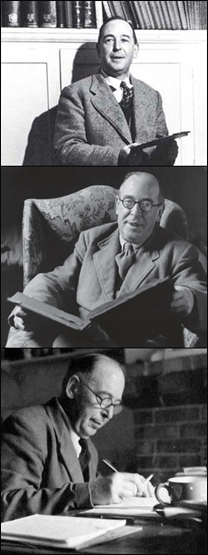
Christopher Hitchens on C. S. Lewis
July 1st, 2007 | Skip to comments
For those of you who have not heard of or seen it, British gadfly-commentator (maybe the only left of center curmudgeon who supports the Iraqi war), Christopher Hitchens (Vanity Fair, Slate, and other wide-syndication publications), has written a book entitled, God is Not Great.
Hitchens’ thesis is that monotheism is a poison and even the most benevolently intended religious dogma turns the world into a bastion of irrationality, violence, and oppression. He includes Christian faith in this category. Currently,
I was particularly intrigued to see what Hitchens would have to say, if anything, about C. S. Lewis in his book. Here are some excerpts, followed by some personal commentary by me.
God is Not Great, by Christopher Hitchens
“While some religious apology is magnificent in its limited way—one might cite Pascal—and to some it is dreary and absurd–here one cannot avoid naming C. S. Lewis—both styles have something in common, namely the appalling load of strain they have to bear. How much effort it takes to affirm the incredible” (p. 7).
“Make just two assumptions: that [Jesus] believed [that he was God] and that he also promised his followers that he would reveal his kingdom before they came to the end of their own lives, and all but one or two of his gnomic remarks make some kind of sense. This point was never put more frankly than by C. S. Lewis (who has recently reemerged as the most popular Christian apologist) in his Mere Christianity. He happens to be speaking about the claim of Jesus to take sin on himself:
Now unless the speaker is God, this is really so preposterous as to be comic. We can all understand how a man forgives offenses against himself. You tread on my toe and I forgive you, you steal my money and I forgive you. But what should we make of a man, himself unrobbed and untrodden on, who announced that he forgave you for treading on other men’s toes and stealing other men’s money? Asinine fatuity is the kindest description we should give of his conduct. Yet this is what Jesus did. He told people that their sins were forgiven, and never waited to consult all the other people whom their sins had undoubtedly injured. He unhesitatingly behaved as if the party chiefly concerned, the person chiefly in all offenses. This makes sense only if He really God whose laws are broken and whose love is wounded in every sin. In the mouth of any speaker who is not God, these words would imply what I can only regard as a silliness and conceit unrivalled by any other character in history.
“It will be noticed that Lewis assumes on no firm evidence whatever that Jesus actually was a “character in history” but let that pass. He deserves some credit for accepting the logic and morality of what he has just stated. To those who argue that Jesus may have been a great moral teacher without being divine (of whom the deist Thomas Jefferson incidentally claimed to be one) Lewis has this stinging riposte:
That is the one thing we must not say. A man who was merely a man and said the sort of things Jesus said would not be a great moral teacher. He would either be a lunatic—on a level with the man who says he is a poached egg—or else he would be the Devil of Hell. You must make your choice. Either this man was, and is, the Son of God: or else a madman or something worse. You can shut Him up for a fool, you can spit at Him and kill Him as a demon; or you can fall at His feet and call Him Lord and God. But let us not come with any patronizing nonsense about His being a great human teacher. He has not left that open to us. He did not intend to.
“I am not choosing a straw man here: Lewis is the main chosen propaganda vehicle for Christianity in our time. Nor am I accepting his rather wild supernatural categories, such as devil and demon. Least of all do I accept his reason, which is so pathetic as to defy description and which takes his two false alternatives as exclusive antithesis, and then uses them to fashion a crude non sequitur (“Now it seems to me obvious that He was neither a lunatic nor a fiend: and consequently, however strange or terrifying or unlikely it may seem, I have to accept the view that He was and is God.”)
However, I do credit him with honesty and with some courage. Either the Gospels are in some sense literal truth, or the whole thing is essentially a fraud, and perhaps an immoral one at that. Well, it can be stated with certainty, and on their own evidence. that the Gospels are most certainly not literal truth. This means that many of the “sayings” and teaching of Jesus are hearsay upon hearsay, which helps explain their garbled and contradictory nature. The most glaring of these, at least in retrospect and certainly from the believer’s point of view, concerned the imminence of his second coming and his complete indifference to the founding of any temporal church. The logia or reported speeches are repeatedly cited, by bishops of the early church who wishes that they had been present at the time but were not, as eagerly solicited third-hand commentaries” (pp. 118-120).
Sigmund Freud wrote that the voice of reason was small, but very persistent. C. S. Lewis tried to prove too much by opining that the presence of a conscience indicated the divine spark” (p. 256).
Hitchens provides Lewis with some mighty but backhanded compliments here.First, he beknightedly credits Lewis with what is, in fact, his status among a majority of English-speaking Christians in the 21st Century, to wit: “This point was never put more frankly than by C. S. Lewis who has recently reemerged as the most popular Christian apologist. . . . the main chosen propaganda vehicle for Christianity in our time.”Next, he notices the “honesty” and the “courage” it takes for Lewis to “affirm the incredible” in a faithless age, clearly denoting the hypocrisy and fraudlent nature of versions of Christianity that deny its supernatural center.
Hitchens also sees that Lewis’s willingness to take the gospels at face value as eyewitness accounts is a key to the force of his arguments, so much so that Hitchens takes great pains to argue that he is not setting up a “straw man,” but only pointing out that he too is shocked (shocked!) that a man with Lewis’s acumen actually appeared to believe this!Finally, he contrasts Freud’s notions of rationality and reason’s place in humankind’s psyche with Lewis’s more profound grasp of the “tertium quid,” the “third thing” that separates man and animal, the conscience, which he regards as evidence of our Creator’s lasting image on our souls. There is the ‘is” and the “ought” and then, thirdly, a voice that tell us that the “ought” should be observed–or so Lewis argues, most notably in The Abolition of Man and in the opening chapters of Mere Christianity.
Hitchens believes that Lewis overstates his case, and needlessly traces this voice to its godly origins, but concedes, even as an atheist, that the conscience informs the day to day escapades of a society and provides, however brittle, a barricade against barbarism. Neither in his book, nor in his exchange with Wilson, does Hitchens really step up to the plate and attempt to answer why humankind continues to believe in the ineffable and try to explain why we cling to the hope of eternal life when, according to him, the evidence is all to the contrary, and it is only the continued brainwashing of gurus and charlatans and some Baptists and Catholics that keep us in servitude. I close here with Doug Wilson’s climactic coda to their invigorating conversation:
You say that you cannot believe that Christ’s death on the Cross was salvation for the world because the idea is absurd. I have shown in various ways that absurdity has not been a disqualifier for any number of your current beliefs. You praise reason to the heights, yet will not give reasons for your strident and inflexible moral judgments, or why you have arbitrarily dubbed certain chemical processes “rational argument.” That’s absurd right now, and yet there you are, holding it. So for you to refuse to accept Christ because it is absurd is like a man at one end of the pool refusing to move to the other end because he might get wet. Given your premises, you will have to come up with a different reason for rejecting Christ as you do.
But for you to make this move would reveal the two fundamental tenets of true atheism. One: There is no God. Two: I hate Him.




[…] from nothing. Hitchens was always a fan of the Christian writer C.S. Lewis as you can see here: http://www.cslewisreview.org/2007/07/christopher-hitchens-on-c-s-lewis/ Hitchens was also friends with members of the Christian community such as Pastor Rick Warren. There […]
Pingback by Why atheism fails: Christopher Hitchens « creationsciencestudy — 8 January 2013 @ 5:51 PM